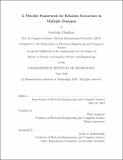| dc.contributor.advisor | Peter Szolovits. | en_US |
| dc.contributor.author | Chauhan, Geeticka. | en_US |
| dc.contributor.other | Massachusetts Institute of Technology. Department of Electrical Engineering and Computer Science. | en_US |
| dc.date.accessioned | 2019-11-04T19:53:39Z | |
| dc.date.available | 2019-11-04T19:53:39Z | |
| dc.date.copyright | 2019 | en_US |
| dc.date.issued | 2019 | en_US |
| dc.identifier.uri | https://hdl.handle.net/1721.1/122694 | |
| dc.description | This electronic version was submitted by the student author. The certified thesis is available in the Institute Archives and Special Collections. | en_US |
| dc.description | Thesis: S.M., Massachusetts Institute of Technology, Department of Electrical Engineering and Computer Science, 2019 | en_US |
| dc.description | Cataloged from student-submitted PDF version of thesis. | en_US |
| dc.description | Includes bibliographical references (pages 81-89). | en_US |
| dc.description.abstract | Relation Extraction (RE) refers to the problem of extracting semantic relationships between concepts in a given sentence, and is an important component of Natural Language Understanding (NLU). It has been popularly studied in both the general purpose as well as the medical domains, and researchers have explored the effectiveness of different neural network architectures. However, systematic comparison of methods for RE is difficult because many experiments in the field are not described precisely enough to be completely reproducible and many papers fail to report ablation studies that would highlight the relative contributions of their various combined techniques. As a result, there is a lack of consensus on techniques that will generalize to novel tasks, datasets and contexts. This thesis introduces a unifying framework for RE known as REflex, applied on 3 highly used datasets (from the general, biomedical and clinical domains), with the ability to be extendable to new datasets. REflex allows exploration of the effect of different modeling techniques, pre-processing, training methodologies and evaluation metrics on a dataset of choice. This work performs such a systematic exploration on the 3 datasets and reveals interesting insights from pre-processing and training methodologies that often go unreported in the literature. Other insights from this exploration help in providing recommendations for future research in RE. REflex has experimental as well as design goals. The experimental goals are in identification of sources of variability in results for the 3 datasets and provide the field with a strong baseline model to compare against for future improvements. The design goals are in identification of best practices for relation extraction and to be a guide for approaching new datasets. | en_US |
| dc.description.statementofresponsibility | by Geeticka Chauhan. | en_US |
| dc.format.extent | 89 pages | en_US |
| dc.language.iso | eng | en_US |
| dc.publisher | Massachusetts Institute of Technology | en_US |
| dc.rights | MIT theses are protected by copyright. They may be viewed, downloaded, or printed from this source but further reproduction or distribution in any format is prohibited without written permission. | en_US |
| dc.rights.uri | http://dspace.mit.edu/handle/1721.1/7582 | en_US |
| dc.subject | Electrical Engineering and Computer Science. | en_US |
| dc.title | A Flexible Framework for Relation Extraction in Multiple Domains | en_US |
| dc.type | Thesis | en_US |
| dc.description.degree | S.M. | en_US |
| dc.contributor.department | Massachusetts Institute of Technology. Department of Electrical Engineering and Computer Science | en_US |
| dc.identifier.oclc | 1124855576 | en_US |
| dc.description.collection | S.M. Massachusetts Institute of Technology, Department of Electrical Engineering and Computer Science | en_US |
| dspace.imported | 2019-11-04T19:53:38Z | en_US |
| mit.thesis.degree | Master | en_US |
| mit.thesis.department | EECS | en_US |
